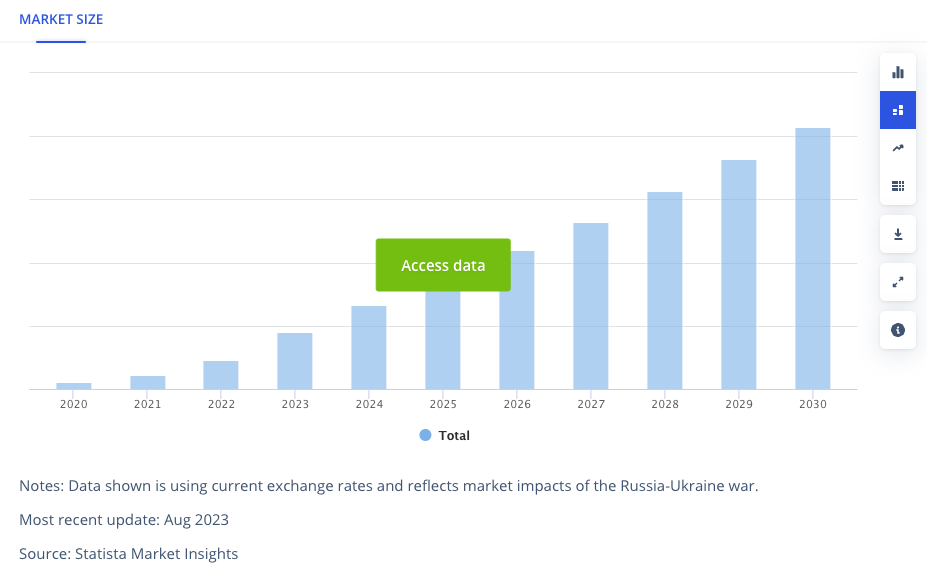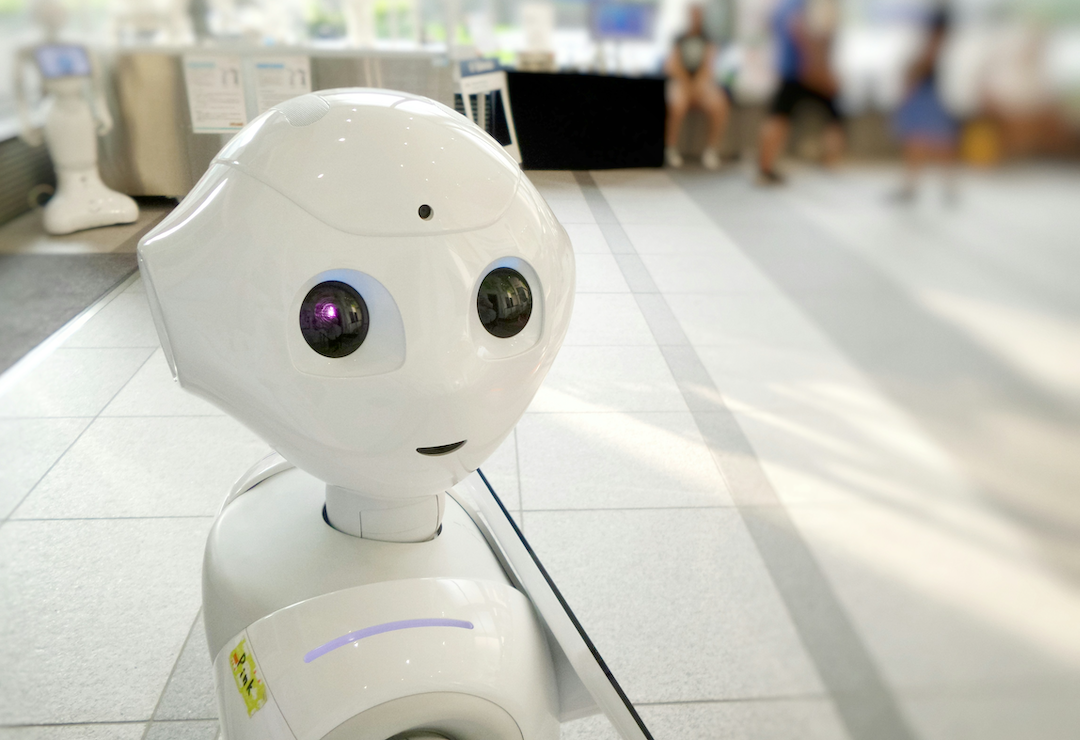
The generative AI market is growing at a fast pace, with businesses looking for options to automate their creative tasks that were earlier possible with human assistance.
The Generative AI market is supposed to grow at a compound annual rate of 20.80%, from approximately US$66.62bn by the end of 2024 to US$207.00bn by 2030.

Businesses have adopted this technology on a large scale to leverage its benefits. Generative AI helps companies to increase productivity and efficiency while reducing costs.
However, enterprises face various challenges when implementing generative AI. This blog post will help you understand Generative AI risks and challenges along with overcoming solutions.
But, before diving into Generative AI challenges, let’s discuss what Generative AI is. Read on to explore.
What is Generative AI?
Generative AI services refer to AI algorithms that can be trained to provide realistic texts, images, or audio. These models are trained with large quantities of data to be capable of delivering desired results. They are trained in a manner that they detect patterns across vast amounts of data that are available online.
GPT-3.5 is one of the foundation models that has been trained with large volumes of text. It can answer questions, summarize text, and even analyze human sentiments. DALL-E is another text-to-image multimodal that can turn words into pictures, like making new versions of old paintings or bigger pictures.
What can Generative AI Do?

Generative AI models can make it easier for organizations to use AI without extensive AI or data science expertise.
Generative AI can be divided into three major capabilities:
- Creating new content and ideas across different formats, such as videos, advertisements, or even designing new proteins for medicine.
- Increasing efficiency by doing repetitive tasks faster, like sending emails, writing code, or summarizing long documents.
- Personalizing experiences by tailoring content for specific audiences, such as chatbots giving customized responses or targeted ads based on customer data.
Today's AI models can learn from vast amounts of online data, including copyrighted materials. Because of this, organizations must be responsible when using AI or partnering with expert AI consulting services. They follow ethical AI practices.
Challenges & Solutions In Generative AI Adoption
What are the risks of generative AI? Generative AI adoption presents numerous challenges, particularly concerning data security, ethical considerations, and the transformation of organizational processes.
Let's explore the challenges posed by Generative AI and uncover effective strategies for navigating through them in our guide to Generative AI solutions.
1. Generative AI Data Security
Challenge: The security of generative AI data has become a significant concern, as demonstrated by incidents such as the ChatGPT outage, which highlights vulnerabilities and privacy violations.
Solution: Implement robust security measures to safeguard sensitive data, including encryption, access controls, and regular security audits. A Generative AI Development Company can effectively assist in fortifying data security measures.
2. Generative AI vs. IP Rights
Challenge: The next challenge of Generative AI is balancing the use of Generative AI with intellectual property rights which raises legal and ethical questions regarding data ownership and privacy.
Solution: Establish clear guidelines for data usage and intellectual property rights, ensuring compliance with relevant laws and regulations. Collaboration with legal experts and consultation with generative AI consulting services can help navigate these complexities.
3. Biases, Errors, and Limitations of Generative AI
Challenge: Generative AI models are susceptible to biases and errors, which can propagate through generated content, impacting accuracy and reliability.
Solution: Implement rigorous data validation processes and diversity-promoting objectives during model training to mitigate biases and errors. Employ artificial intelligence developers or collaborate with a company to ensure the effective implementation of these strategies.
4. Dependence on the 3rd Party Platform
Challenge: Organizations relying on third-party Generative AI platforms may face challenges of Generative AI in adapting to platform availability or functionality changes.
Solution: Diversify Generative AI platforms and remain adaptable to changes in the market by maintaining a flexible approach to technology adoption. Collaboration with Generative AI Integration Services can facilitate seamless transitions and minimize disruptions.
5. Limited Talent Pool
Challenge: The demand for skilled professionals in Generative AI development exceeds the available talent pool, posing challenges for organizations seeking expertise in this field.
Solution: Invest in training programs and talent development initiatives to nurture a skilled workforce in Generative AI development. Collaboration with educational institutions and recruitment agencies can help identify and cultivate talent effectively.
6. AI Training and Acceptance
Challenge: The challenges of Generative AI include integrating AI into organizational structures requiring technical updates and cultural shifts, and facing resistance from stakeholders.
Solution: To facilitate smooth AI adoption, provide comprehensive training programs, and foster a culture of acceptance and innovation within the organization. Collaboration with a generative or adaptive AI development company can support organizational change management efforts.
7. Establishing Return on Investment
Challenge: Measuring the return on investment for AI initiatives can be challenging, as benefits may not translate directly into financial metrics.
Solution: Develop comprehensive metrics for assessing the impact of AI initiatives on business outcomes and customer satisfaction. Employ AI developers or collaborate with consulting services for assistance in establishing clear ROI frameworks and performance indicators.

8. Data Accuracy and Quality
Challenge: Generative AI relies heavily on high-quality data for training, but managing large volumes of data accurately can be complex and challenging.
Solution: Implement rigorous data quality control measures, including data validation and cleansing processes, to ensure the accuracy and reliability of training data. Collaboration with data management experts and utilizing advanced data analytics tools can help maintain data quality standards effectively.
9. Data Security and Privacy
Challenge: AI systems' handling of sensitive and personal data raises significant concerns regarding data security and privacy protection.
Solution: To safeguard sensitive information, implement robust data security protocols, including encryption, access controls, and regular security audits. Collaborating with cybersecurity experts and professionals can ensure data protection regulations and standards compliance.
10. AI Ethics and Responsibility
Challenge: The widespread adoption of AI technologies brings forth complex ethical and responsibility considerations, particularly concerning transparency and accountability in AI decision-making.
Solution: Establish clear ethical guidelines and governance frameworks for AI usage, ensuring transparent decision-making processes and accountability mechanisms. Collaboration with ethics committees and legal experts can help address ethical dilemmas and ensure responsible AI deployment.
11. Engaging Legacy Systems
Challenge: Integrating AI technologies with legacy systems poses unique technical and organizational challenges of Generative AI, requiring careful consideration and planning.
Solution: Evaluate existing systems and infrastructure to identify compatibility and integration requirements for AI adoption. Collaboration with IT experts and technology consultants can facilitate seamless integration and modernization of legacy systems to leverage AI capabilities effectively.
12. Avoiding Technical Debt
Challenge: Failure to anticipate and address technical debt in AI adoption can lead to long-term inefficiencies, limitations, and challenges of Generative AI.
Solution: Adopt a proactive approach to managing technical debt by prioritizing scalability, flexibility, and maintainability in AI implementation. Collaboration with software engineering teams and AI experts can help mitigate technical debt risks and ensure sustainable AI deployment.
13. Anticipating AI Misuse and Hallucinations
Challenge: AI models may be susceptible to misuse and manipulation, leading to the creation of deceptive or misleading content.
Solution: Implement robust security measures and validation processes to detect and prevent AI misuse, including authentication mechanisms and content verification tools. Collaboration with cybersecurity specialists and AI ethics experts can help mitigate risks associated with AI hallucinations and malicious use.
14. Providing Coordination and Oversight
Challenge: Coordinating AI initiatives and ensuring effective oversight across organizational functions require dedicated resources and governance structures.
Solution: Establish dedicated centers of excellence and cross-functional teams to oversee AI initiatives and ensure alignment with organizational goals and objectives. Collaboration with project management experts and executive leadership can facilitate effective coordination and oversight of AI adoption efforts.
By addressing these challenges of Generative AI and implementing appropriate solutions, organizations can increase the benefits of Generative AI adoption while mitigating associated risks and challenges.
Collaboration with experienced partners and interdisciplinary teams is essential to ensure successful and responsible integration of Generative AI technologies into business operations.
Future of Generative AI for Enterprises

Embracing a technological revolution brings excitement and expectation, yet its full impact remains uncertain due to our tendency to both overestimate and underestimate its potential.
Nonetheless, current market trends offer insights into the evolving role of Generative AI in shaping enterprises' future.
1. Generative AI Revolutionizing Software Interaction
Generative AI, or Gen AI, is poised to revolutionize software interaction, paving the way for more intuitive and personalized interfaces. As its integration expands, we can expect software systems to adapt to individual users' needs and preferences, enhancing user interaction and satisfaction.
2. Generative AI Enhancing Personalization
The versatility of Generative AI in generating text, speech, images, music, and code is driving significant transformations. By incorporating user-specific details, it streamlines task execution and improves software accessibility. This enables the creation of adaptive systems capable of processing vast amounts of information while delivering accurate outcomes consistently.
3. Generative AI Driving Competitive Advantage
Generative AI will become a cornerstone of competitive differentiation for brands in today's market landscape. Its integration offers opportunities to develop unique value propositions, enabling businesses to provide innovative products and customer experiences that help them stand out among competitors.
4. Generative AI Fueling Business Transformation
AI, including Generative AI, is instrumental in guiding businesses through operational, structural, and customer relationship transformations in the current technological era. This evolution leads to cost-efficient processes, increased productivity, and avenues for innovation and expansion.
As enterprises continue to embrace Generative AI, they must stay agile and innovative, leveraging its capabilities to effectively navigate the evolving business landscape. Collaboration with AI experts and strategic planning will be crucial in harnessing the full Generative AI potential for sustainable growth and competitive advantage.
Conclusion
As we dive deeper into the realm of generative AI, it becomes clear that the challenges of Generative AI are multifaceted and complex. However, we pave the way for groundbreaking innovations by addressing these hurdles head-on.
Despite these obstacles, the opportunities presented by generative AI are truly remarkable:
"By embracing the challenges of generative AI, we unlock a world of
unprecedented creativity, efficiency, and personalization."
Share this post
Leave a comment
All comments are moderated. Spammy and bot submitted comments are deleted. Please submit the comments that are helpful to others, and we'll approve your comments. A comment that includes outbound link will only be approved if the content is relevant to the topic, and has some value to our readers.

Comments (0)
No comment